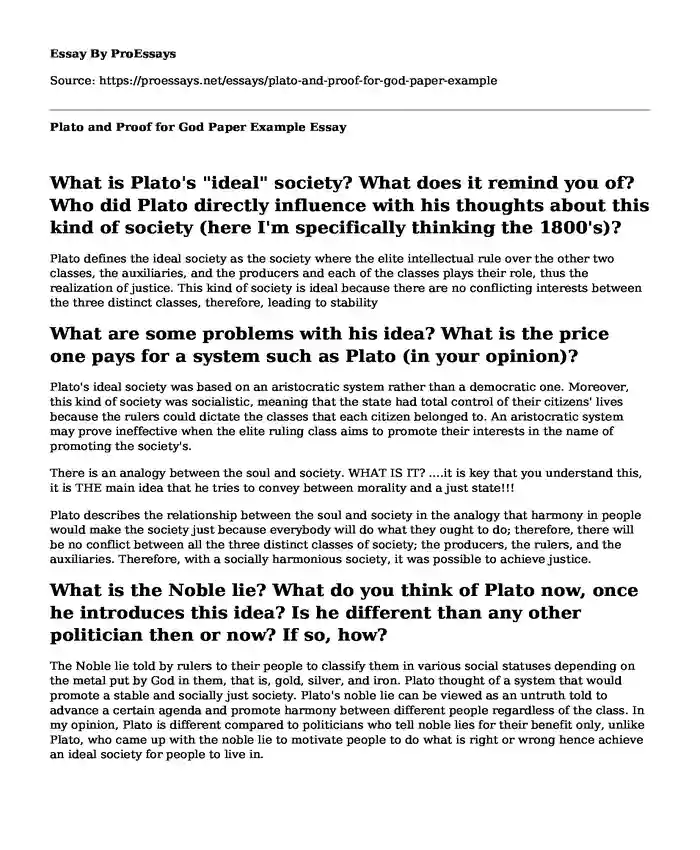What is Plato's "ideal" society? What does it remind you of? Who did Plato directly influence with his thoughts about this kind of society (here I'm specifically thinking the 1800's)?
Plato defines the ideal society as the society where the elite intellectual rule over the other two classes, the auxiliaries, and the producers and each of the classes plays their role, thus the realization of justice. This kind of society is ideal because there are no conflicting interests between the three distinct classes, therefore, leading to stability
What are some problems with his idea? What is the price one pays for a system such as Plato (in your opinion)?
Plato's ideal society was based on an aristocratic system rather than a democratic one. Moreover, this kind of society was socialistic, meaning that the state had total control of their citizens' lives because the rulers could dictate the classes that each citizen belonged to. An aristocratic system may prove ineffective when the elite ruling class aims to promote their interests in the name of promoting the society's.
There is an analogy between the soul and society. WHAT IS IT? ....it is key that you understand this, it is THE main idea that he tries to convey between morality and a just state!!!
Plato describes the relationship between the soul and society in the analogy that harmony in people would make the society just because everybody will do what they ought to do; therefore, there will be no conflict between all the three distinct classes of society; the producers, the rulers, and the auxiliaries. Therefore, with a socially harmonious society, it was possible to achieve justice.
What is the Noble lie? What do you think of Plato now, once he introduces this idea? Is he different than any other politician then or now? If so, how?
The Noble lie told by rulers to their people to classify them in various social statuses depending on the metal put by God in them, that is, gold, silver, and iron. Plato thought of a system that would promote a stable and socially just society. Plato's noble lie can be viewed as an untruth told to advance a certain agenda and promote harmony between different people regardless of the class. In my opinion, Plato is different compared to politicians who tell noble lies for their benefit only, unlike Plato, who came up with the noble lie to motivate people to do what is right or wrong hence achieve an ideal society for people to live in.
Why do suppose the rulers could not own property? Why do you suppose they could not marry? How would this better a society?
According to Plato, the rulers could not own property or marry, so that they would only focus on serving the society entirely rather than promoting their materialistic needs. However, the rulers enjoyed the political power to make decisions and guide society in a good manner. They made the rules that should be followed by the two other classes who had the power to own property and marry. The rulers could not own property because they would use their ruling positions to gain in terms of property and other luxuries. This would make society better because unlike what most leaders do in the current world; they would lead well and promote the interest of everyone, therefore establishing a fair and just society.
What is a virtue for Plato?
Virtue is knowledge, and knowledge results in happiness; therefore, with virtue comes happiness. With virtue, there is a stable and more just society because people live together without conflicts.
What is the Divine Command Theory?
This theory of ethics states that an act is either moral or immoral if God commands us to do it or prohibits us from doing it, respectively, meaning that whether an act is right or wrong depends on whether God commands it or not without any external constraint.
What problems does Plato expose with it?
The Divine command theory undermines the objectivity of ethics because it states that God's commands do not require any justification based on any external principles. The theory insists that what is right or wrong depends on what one's God says (referred to as moral relativism). Therefore, what is defined as wrong or right is depends upon God's commands hence subjective to God's fiat because whatever God commands is the standard of moral righteousness and no external moral values can constrain what is to be commanded or not.
What is the rebuttal made from a believer (a theist)?
A theist argues that a standard of morality is not external to God but is part of God's nature.
Cite this page
Plato and Proof for God Paper Example. (2024, Jan 05). Retrieved from https://proessays.net/essays/plato-and-proof-for-god-paper-example
If you are the original author of this essay and no longer wish to have it published on the ProEssays website, please click below to request its removal:
- Integrative Essay
- Spirituality in Hospice and Palliative Care Essay
- The Connection Between Ethics and Politics Paper Example
- Essay on Sports Evangelism: Connecting Faith and Fans Worldwide
- Historical Books of Israelites: Narrating the Past to Explain the Present - Essay Sample
- God's Promised Messiah: Jesus, King of Israelites - Essay Sample
- Free Report Example on Ethical Dilemmas in Healthcare: Challenges and Solutions







